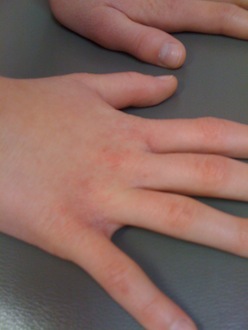Home remedies for dry, chapped hands

Raw hands- recognize your kid?
Even when it isn’t flu season, we pediatricians wash our hands about sixty times a day, maybe more. This frequent washing, in combination with cold winter air, leads to dry, chapped hands. Here are the hands of a patient. Do your children’s hands look like these?
To prevent dry, chapped hands:
• Don’t stop washing your hands, but do use a moisturizer afterwards. Also use warm but not hot water. Hot water removes protective oils from skin.
• According to the American Academy of Dermatology, hand sanitizer can prevent the drying that accompanies frequent hand washing. However, we can tell you from experience that once your hands are already chapped and cracked, the alcohol content in the sanitizers stings sensitive skin. So if your child’s hands are already chapped, stick with water and soap.
• Wear gloves or mittens as much as possible outside even if the temperature is above freezing. Remember chemistry class—cold air holds less moisture than warm air and therefore is unkind to skin. Gloves will prevent some moisture loss. Having difficulty convincing your child to wear gloves? Point out that refrigerators are kept around 40 degrees Fahrenheit or below. Tell your kids that if they wouldn’t sit inside a refrigerator without layers, then it would be wise to wear gloves.
• Before exposure to any possible irritants such as the chlorine in a swimming pool, protect the hands by layering heavy lotion (e.g. Eucerin cream) or petroleum based product (e.g. Vaseline or Aquaphor) over the skin.
To rescue dry, chapped hands:
• Prior to bedtime, smother hands in 1% hydrocortisone ointment. Avoid the cream formulation. Creams tend to sting if there are any open cracks. Take old socks, cut out thumb holes and have your child sleep at night with the sock on his hands. Repeat nightly for up to a week. Alternatively, for mildly chapped hands, use a petroleum oil based product such as Vaseline or Aquaphor in place of the hydrocortisone.
• If your child has underlying eczema, prevent your child from scratching his hands. An antihistamine taken orally such as diphenhydramine (Benadryl) or cetirizine (Zyrtec) will take the edge off the itch. Keep his nails trimmed to avoid further damage from scratching.
• For extremely raw hands, your child’s doctor may prescribe a stronger cream and if there are signs of a bacterial skin infection, your child’s doctor may prescribe an antibiotic.
Happy moisturizing. Remember smearing glue on your hands and then peeling off the dried glue? It’s not so fun when your skin really is peeling.
Naline Lai, MD and Julie Kardos, MD
© 2009, updated 2019, Two Peds in a Pod®